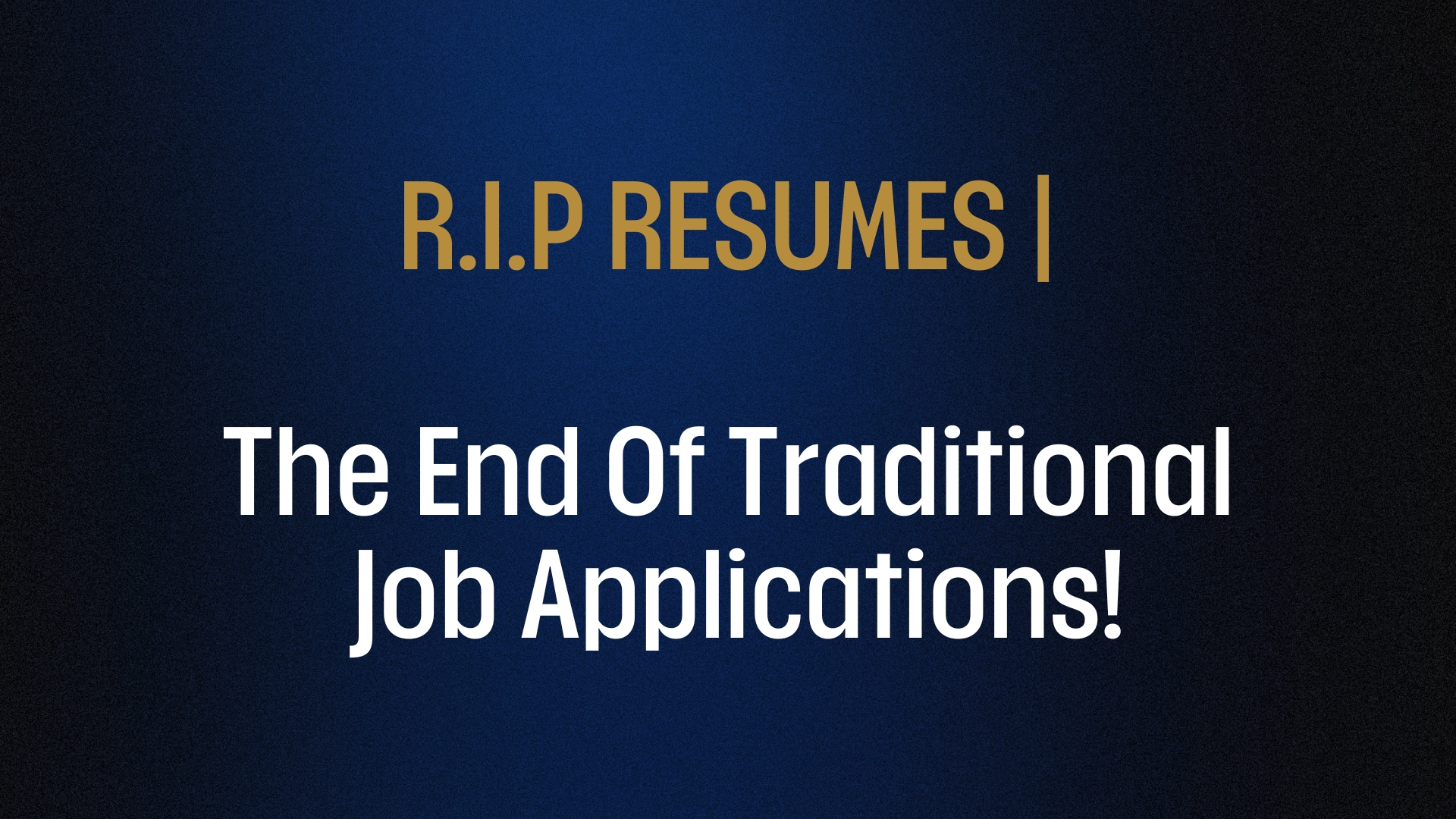R.I.P Resumes! The End Of Online Job Applications!

In today's digital job market, it might come as a surprise to hear that online job applications, resumes, and CVs are no longer as effective as they once were. While these traditional tools have been the backbone of job searching for decades, a recent shift in hiring practices is changing the game, particularly for highly skilled professionals. If you've been tirelessly applying online without results, this article might explain why.
The Decline of Resumes and Online Job Applications
Many companies are now realizing that hiring based on resumes alone is outdated. A recent study from the State of Skills-Based Hiring 2023 reveals that 87% of employers experience issues when relying on resumes to identify talent. This approach often leads to challenges such as inaccuracies in resume content, difficulty in ranking applicants, and unconscious biases. As a result, the recruitment process has started to pivot away from traditional resumes toward skills-based hiring.
Instead of relying on resumes, 73% of companies have moved toward evaluating candidates through practical, skills-based assessments—a 177% increase from just a year ago. This approach allows employers to directly test an applicant's real-world abilities, rather than relying on a paper summary. It’s a stark indication that the era of “one-size-fits-all” applications may be ending.
Skills-Based Hiring: The New Standard
With the shift to skills-based hiring, companies are looking for proof of your abilities. Simply listing skills on a resume is no longer sufficient. Now, it’s essential to provide evidence of how you have applied these skills in previous roles and how they can contribute to the success of a future employer. This shift represents a major transition in recruitment, where companies seek direct insights into a candidate’s value.
Skills-based hiring also emphasizes testing and practical assessments, which enable companies to focus on candidates’ proven capabilities rather than on their academic or professional history alone. This method is not only fairer but also helps employers address the skill shortages in today’s job market. For you as a job seeker, this means that proving your skill set has never been more crucial.
Demonstrating Your Value Beyond the Resume
So, how do you stand out without solely relying on online job applications? The answer lies in demonstrating your value. This goes beyond a list of job titles or skills; it means providing real examples of your accomplishments, quantifying the impact of your work, and showing how you solved specific challenges in previous roles.
For instance, if you're in a marketing role, don’t just list “SEO” as a skill. Instead, highlight how your SEO strategies increased organic traffic by a certain percentage or led to tangible revenue growth. Companies are increasingly interested in the return on investment (ROI) that you can bring to them, so showcasing your achievements in measurable terms is key.
The LinkedIn Advantage for Job Seekers
If you're serious about proving your skills and demonstrating your value, LinkedIn is an indispensable tool. With LinkedIn, you can showcase a portfolio of your work, gather endorsements from colleagues, and build a network that can vouch for your expertise. Unlike a resume, LinkedIn allows you to continuously update your profile and maintain a dynamic presence in your industry.
Many candidates who focus on leveraging LinkedIn have landed roles without ever needing to submit a formal application. Instead, they are often approached by recruiters or hiring managers who recognize their skills and value from their online presence. This is particularly advantageous for professionals seeking international opportunities, as LinkedIn can help them connect with global employers.
The Benefits of Moving Away from Online Job Applications
Transitioning away from online job applications and focusing on a more strategic, skills-based approach offers several advantages. First, you’re not competing with the hundreds—or even thousands—of other candidates who apply online. This means you’re more likely to stand out, especially if your profile effectively demonstrates your unique value. Second, by sidestepping applicant tracking systems (ATS), you eliminate the risk of being filtered out before a human even reviews your profile.
Instead, when you focus on building an impactful LinkedIn profile and showcasing your skills, you position yourself as a top candidate with a unique value proposition. This aligns you with employers who are looking for top talent without sifting through endless applications. Think of it as creating your own “blue ocean”—a market space where competition is minimal and where you have greater control over your career narrative.
Final Thoughts
While online job applications and resumes were once the cornerstone of job searching, the landscape has evolved. Skills-based hiring and value demonstration are now more important than ever. For job seekers, this shift represents an opportunity to stand out by proving skills and demonstrating value directly to potential employers.
If you’re ready to rise above the competition and make an impact in the new world of work, it’s time to rethink your approach. Focus on building a professional profile that showcases your skills, quantifiable achievements, and potential contributions to prospective employers. By adopting these methods, you can move beyond traditional applications and position yourself as a top contender in today’s competitive job market.